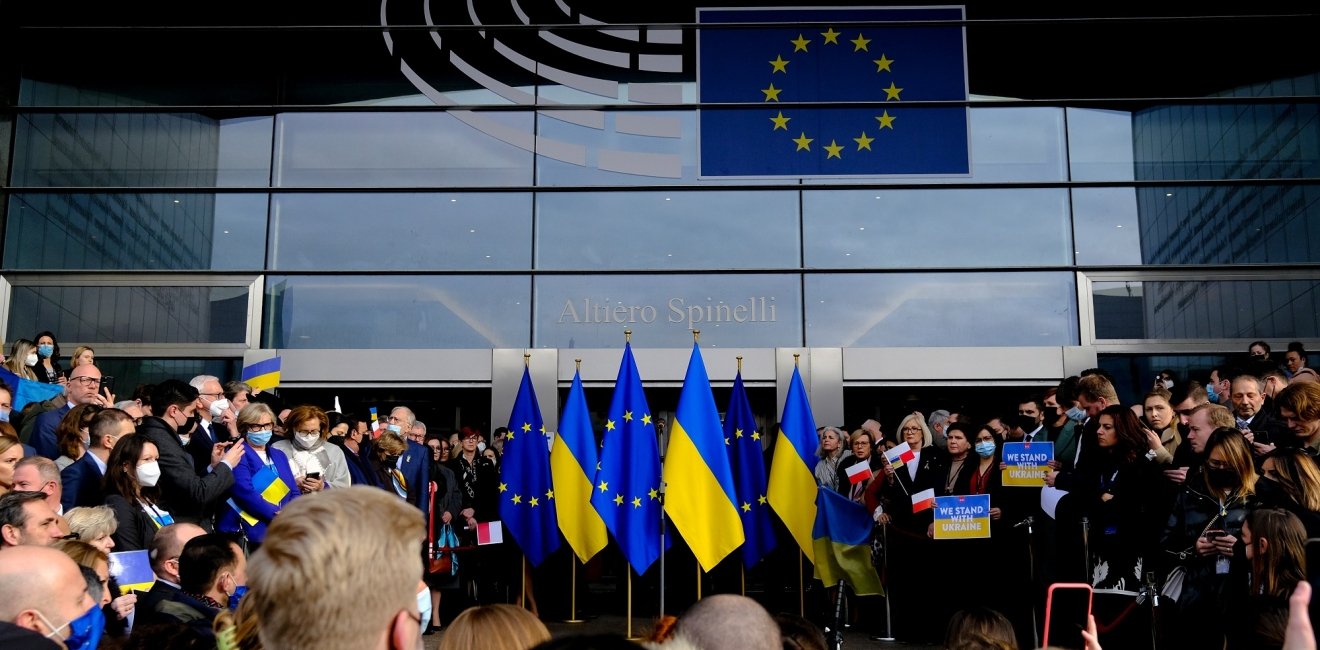Observers are calling the Russian invasion of Ukraine Europe’s “9/11,” and the European Union’s immediate reaction a Copernican revolution. This past weekend saw the EU’s typical doctrine of slow process and indecisiveness go out the window. At long last, the EU acted as a geopolitical force to be reckoned with - at least by Russia. After an initially slow start, the European Union demonstrated an abrupt U-turn in security policy and is finally acting like a great power capable of projecting influence.
The conflict in Ukraine has stirred the emergence of a newly awakened European Union that is willing to provide arms and seriously rethink its security posture. For the first time ever, the EU will purchase and provide weapons and equipment to a warzone with its announcement of €450 million in weapons for Ukraine. The EU is shutting down its airspace to Russian planes, including private jets chartered by oligarchs. It also banned all Russian-owned media and froze Russian bank assets. These sanctions against Russia and the support for Ukraine were a result of swift decision-making, and for good reason–because for the first time in 30 years Europe’s security order is under attack. War in Europe was something unimaginable for the post-Cold War generation, but Russia shattered any illusions of peace when it invaded Ukraine and made it easy for all EU members to take a stance against Putin’s attack. Very rarely has a conflict ever been as a black-and-white, with aggressor and defender clearly identifiable. After much soul-searching in Europe’s capitals, leaders and citizens reached the obvious conclusion: economic appeasement of Russia had completely failed to deter Russian aggression - in fact, it only galvanized Putin’s military action.
Within the European bloc, Germany showed the biggest about-face. In just a few short days, Germany’s approach to defense issues and its relations with Russia dramatically shifted. The new Chancellor Olaf Scholz announced the German government will send 1,000 anti-tank weapons and 500 Stinger anti-aircraft defense systems to Ukraine, reversing its historic policy of never sending weapons to conflict zones. He committed Germany to spending more than 2 percent of its GDP on the military, a new high water mark for defense spending and hitting the NATO benchmark. And Germany suspended the controversial Nordstream 2 gas pipeline from Russia. Although many of these policy changes may seem like Germany simply coming around to better alignment with the West, it reflects a dramatic upheaval of decades of foreign policy and precedent.
Far from “brain dead”, as it was declared in 2019 by French President Emmanuel Macron, Russia’s invasion of Ukraine has reinvigorated the alliance for decades to come. This is apparent by the dramatic shift in popularity for joining the alliance on display in Finland and Sweden. For the first time, support for Finland to join the NATO alliance exceeded 50 percent. And the European Union’s own efforts to create a defensive union, one that would run parallel to NATO without duplication, saw its first ever action through the deployment of a cyber division to combat cyber attacks from Russia.
Although these actions are laudable, it is too soon to tell whether this upswell of unity among European Union members can be sustained in the long run. If the war in Ukraine turns into a grinding, bloody battle between Ukrainian citizens and Russian troops, the media and political leaders might well turn their attention to other news. Rising prices at gas stations and supermarkets could also pressure European politicians to reverse some of the early action against the Russian economy. We are already seeing EU members walking back a promise to send fighter jets to Ukraine.
The European Union may have lost its luster in recent years, but aspiring members continue to believe in its promise. Ukraine is perhaps the most powerful case in point. After all, it was the failed free trade agreement between the EU and Ukraine that sparked the Maidan revolution and inspired a generation of Ukrainians to put their lives on the line for the principles and future that the EU embodies. It’s easy to assume that Europe’s crisis of confidence will prove a lasting condition. Indeed, internal democratic backsliding and populist political forces have led many to doubt whether the EU could welcome and integrate new members knocking on its door. The fact that Commission president Ursula von der Leyen offered Ukraine a path into the EU suggests that European leaders are not turning inward in this moment of peril. While it still does not mean that an EU membership is imminent for Ukraine, it conveys that Brussels is reconsidering its public stance and realizing its own appeal.
Proclamations of “the hour of Europe” have come and gone before, but with the largest war raging on the EU’s doorstep since World War 2, nothing is guaranteed about its future trajectory. To sustain the momentum, the EU should back up its actions by cutting its dependence on Russian oil and gas. Even before Russia’s invasion, Europe needed a renewable energy revolution - now it has the geopolitical incentives to follow through and deploy as many solar panels and wind turbines as soon as possible. Additionally, the sudden realization that Western appeasement of Russian oligarchs and Russia’s capture of European political elites indirectly funded Putin’s military operations should not just lead to sanctions against the main players but be prevented in the future through anti-corruption laws. And lastly, if there was ever a time to consider forming a European army, it is now. The United States won’t be able to provide Europe with a security umbrella the same way it has over the last 70 years.
Russia’s invasion of Ukraine is proving to be a hinge moment for the European Union. It is forcing the EU to step up, united against Russian aggression. The EU was forged in history and yet has spent decades attempting to transcend it. This is perhaps its greatest challenge: to forge an ever closer union of values in a world increasingly less hospitable to them. For that, the EU will need to ally power with principle. The actions of the last week show that it is on the right track.
Authors



Global Europe Program
The Global Europe Program is focused on Europe’s capabilities, and how it engages on critical global issues. We investigate European approaches to critical global issues. We examine Europe’s relations with Russia and Eurasia, China and the Indo-Pacific, the Middle East and Africa. Our initiatives include “Ukraine in Europe”—an examination of what it will take to make Ukraine’s European future a reality. But we also examine the role of NATO, the European Union and the OSCE, Europe’s energy security, transatlantic trade disputes, and challenges to democracy. The Global Europe Program’s staff, scholars-in-residence, and Global Fellows participate in seminars, policy study groups, and international conferences to provide analytical recommendations to policy makers and the media. Read more

Explore More
Browse Insights & Analysis
US Inaction Is Ceding the Global Nuclear Market to China and Russia

Promoting Convergence in US-Brazil Relations


